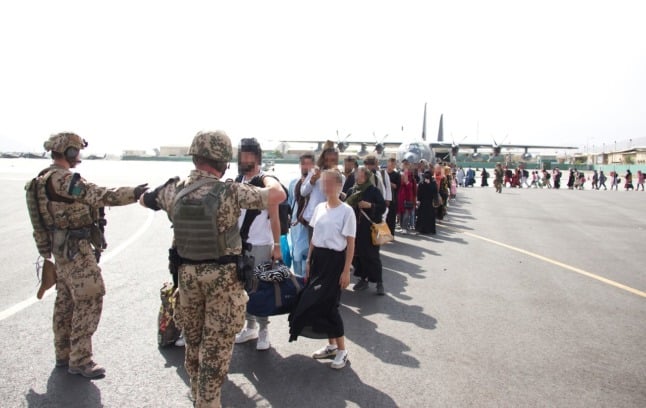Whatever your opinion is regarding the NATO mission in Afghanistan few people can doubt that the countries involved, of which Germany was one, have a moral obligation to the local staff who helped them in their attempts to build a democracy there over the past two decades.
It is no secret that the Taliban have targeted these people as “collaborators” and threatened to kill them for what they call their “betrayal of Islam”.
But Germany, a country that has built a reputation for itself in recent years as a bastion of humanitarianism, has for months put up bureaucratic roadblocks to make the process of escaping the country as difficult as possible.
Alone among the NATO members, Germany imposed a time limit on who it was prepared to help. Initially only Afghans who had worked with the German army, the development ministry, or foreign ministry over the past two years were entitled to receive a visa to travel to Germany.
Anyone who worked with the Bundeswehr as a translator or with the development ministry as a facilitator in 2018 or earlier was told that they didn’t qualify for protection. This cut-off date is absurdly arbitrary – it is clear that the Taliban would make no such distinction when deciding whether someone was a collaborator or not. They remember very well that they were removed from power in 2001 and not in 2018.
Only this Tuesday due to a public outcry did the foreign and development ministries confirm that people who’d worked for them from 2013 onwards would be flown out. (The defence ministry relaxed its rules a few weeks ago.)
But with the last airlift out of Taliban likely to take place on Friday, the race is now on for these people, who are hiding in terror from the Taliban, to make it to Kabul airport and escape.
‘Botched rescue’
According to Angela Merkel, some 4,600 people have so far been airlifted out of the country, although it is unclear how many of these are locals given that the evacuees come from 45 different countries. But the lucky few Afghans who have made it out have been put through far more trauma than was necessary.
When the Bundeswehr left its base at Mazar-a-Sharif in the north of Afghanistan ahead of schedule at the beginning of July it didn’t take its local staff with it. These people had to wait for their visas to be processed before arranging their own exit from the country.
Within weeks though Mazar-a-Sharif had fallen to the Taliban and local staff were forced to flee to Kabul were they were hidden in safe houses organized by a charity run by German soldiers called the Patenschaftsnetzwerk Afghanische Ortskräfte.
This Tuesday, the charity’s head, Marcus Grotian, complained that the German government had botched the rescue effort so badly that it was culpable of the crime of unterlassene Hilfeleistung (denial of assistance).
Gortian recounted how the Afghans whom his team were protecting were directed by German embassy to the UN run International Organization for Migration (IOM), which was supposed to sort out visas for them. The only problem: the IOM office in Kabul hadn’t been opened yet and would only reply by email.
Eventually the situation became so dangerous that the Patenschaftsnetzwerk Afghanische Ortskräfte had to tell the people at the safe houses to find cover elsewhere: the Taliban were getting too close.
Seething with anger, Grotian recounted how he had appealed to Chancellor Angela Merkel on four separate occasions to directly intervene, but was ignored each time.
“Many of us soldiers are experiencing trauma for a second time,” Grotian said. “But it is not the Taliban that is causing it, it is the actions of our own government.”
In another scandal, der Spiegel has reported that the Development Ministry has been offering local staff a “cash bonus” as an incentive for staying behind. One Afghan employee of the ministry described the offer as “devastating”, saying that “we don’t want money, we want security.”
Fearing a ‘pull effect’
Why, you might ask, is Germany, which is famous for its efforts to save Syrian refugees during the crisis of 2015, now so reluctant to help people whose lives are in direct danger because of their work supporting German diplomats and development workers?
Well, the shadow of 2015 still looms large over German politics.
In the autumn of that year Merkel’s government had only intended to offer refuge to a few thousand Syrians who were stranded in Hungary, where the far-right government wanted to have nothing to do with them.
But taking in those refugees set off a chain of events that the German government felt helpless to put a stop to. As word spread back through refugee routes from Syria, through Turkey and into Greece that Germany was taking in refugees, one of the largest movements of people in recent European history took place, with thousands more people arriving at the southern border every day.
READ MORE:
- Germany halts development aid for Afghanistan
- German army evacuates more than 2,700 people from Afghanistan
While most of these people were war refugees, economic migrants also saw an opportunity to make use of the open border. Meanwhile Islamist groups saw a chance to move their fighters into western Europe.
The German government stopped imposing European rules on refugee intake – the so-called Dublin regulations – and in practise it stopped evaluating the individual cases of asylum seekers coming from Syria.
In hindsight, this loss of control of the country’s borders and the decision to weaken rules on asylum recognition were the main catalyst for one the the most regrettable developments in post-war history: the fact that a far-right party now sits in the Bundestag.
Before the last federal election in 2017 the far-right Alternative for Germany (AfD) painted doom-laden scenarios of up to 8 million Syrians migrating to Germany. That this would ever come true was highly improbable, but the often chaotic events of the previous two years had made it seem at least plausible to many Germans.
Senior members of the German government are clearly terrified of a repeat of that scenario. Development Minister Gerd Müller warned Defence Minister Annegret Kramp-Karrenbauer in June against any attempts to widen Germany’s strict rules on which Afghans are to be given visas.
“It should also be borne in mind that such a decision could have an enormous pull effect beyond the defined group,” he wrote, in clear reference to the events of 2015.
This stance is one of moral cowardice though. The Geneva Convention on Refugees specifically protects people who face persecution due to their political opinions. Surely there is no more clear cut case of this than the local staff who helped Germany in Afghanistan?
What happens next for Afghan employees of the German government is far from certain. Those who don’t make it onto planes will likely have to make a much more dangerous journey across land to the northern borders with Uzbekistan.
Individual soldiers whose lives they protected will try and help them. How much effort the German government puts into saving them remains to be seen.
Jörg Luyken is the creator of The German Review. You can sign up to his bi-weekly newsletter on German current affairs here.






 Please whitelist us to continue reading.
Please whitelist us to continue reading.
Member comments